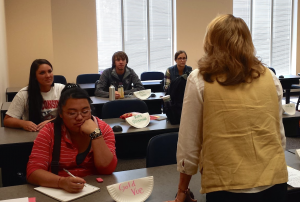Despite a recent statement from the American Association of University Professors condemning the use of trigger warnings in college classrooms and on class syllabi, many St. Thomas professors plan to continue warning students of sensitive material.
The AAUP labeled the warnings as infantilizing and anti-intellectual, and it stated that “the specific call for ‘trigger warnings’ began in the blogosphere as a caution about graphic descriptions of rape on feminist sites, and has now migrated to university campuses in the form of requirements or proposals that students be alerted to all manner of topics that some believe may deeply offend and even set off a post-traumatic stress disorder (PTSD) response in some individuals.”

Psychology professor Ann Johnson said while the phrase is fairly new, it describes something that professors have been doing for years.
“Just to simply tell students at the outset that this is sensitive or controversial material, and if you find it disturbing, let me know. People have been doing that for years, and nobody thought to call it a trigger warning; that’s new terminology,” Johnson said.
Adjunct psychology professor Lauren Braswell said she understands the AAUP’s point of view but still gives her students warnings at the beginning of the semester.
“I’m certainly sympathetic to the fact that you don’t want to lose the possibility of discussing really meaningful topics in the classroom, many of which do have some controversy around them,” Braswell said. “On the other hand, I am trained as a clinical psychologist and worked in clinic for a number of years first before I started teaching and so, given the topics I tend to teach, it’s just been natural.”
Sophomore Dan Sauro said a conversation with students before class starts could be beneficial.
“Say a student does have prior history with difficulties in their life – it’d be good to know as a professor, probably not the whole class, so the professor could adjust anything if they need to or get them in contact with counseling, let’s say, if they need it,” Sauro said.
Johnson said she thinks using trigger warnings is a good teaching practice and does not see its use at St. Thomas causing any problems.
“It’s just really an expression of compassion to let people know that you’re going to be covering material that may be troubling to them,” Johnson said.
Sophomore Connor Cauble also said he thinks it might be a good idea to bring up difficult course material ahead of time.
“I don’t think we should be angry at professors that aren’t doing it now or anything because that’s just part of class and the curriculum; it’s not like they’re doing anything bad,” Cauble said. “But at the same time, I think it’d probably be a good idea for some people who have had tough times.”
Although Johnson doesn’t agree, she said she can see why some students and professors might be opposed to trigger warnings.
“I know that people have been complaining,” Johnson said. “I think some people see … a professor offering a trigger warning as kind of a sign of pandering to some sort of political correctness culture.”
The occasion to use trigger warnings can arise in many different subjects, not just psychology.
“Certainly in English classes sometimes you read literary texts that some students are likely to find troubling,” Johnson said. “I would guess that some faculty address it and maybe some faculty don’t.”
Johnson said these warnings open up opportunities to remind students about the personal counseling services at St. Thomas.
“St. Thomas does offer resources to students who might find themselves troubled or depressed after covering certain types of material in class,” she said.
She added that trigger warnings can benefit all students, not just those who may have gone through a difficult experience.
“It alerts the other students in the class to the possibility that some people might have experienced traumatic instants in their lives,” Johnson said. “Maybe it creates a kind of culture of empathy, I would hope.”
Jamie Bernard can be reached at bern2479@stthomas.edu.

